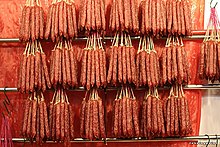Chinese sausage

Dried Chinese sausages
|
|
| Alternative names | lap cheong, lap chong |
|---|---|
| Course | Sausage |
| Place of origin | China |
| Main ingredients | fresh pork or liver |
| |
|
| Chinese sausage | |||||||||||||||||||||
| preserved sausage | |||||||||||||||||||||
|---|---|---|---|---|---|---|---|---|---|---|---|---|---|---|---|---|---|---|---|---|---|
| Traditional Chinese | |||||||||||||||||||||
| Simplified Chinese | |||||||||||||||||||||
| Literal meaning | preserved sausage | ||||||||||||||||||||
|
|||||||||||||||||||||
| liver sausage | |||||||||||||||||||||
| Traditional Chinese | |||||||||||||||||||||
| Simplified Chinese | |||||||||||||||||||||
| Literal meaning | liver sausage | ||||||||||||||||||||
|
|||||||||||||||||||||
| Vietnamese name | |||||||||||||||||||||
| Vietnamese | lạp xưởng | ||||||||||||||||||||
| Thai name | |||||||||||||||||||||
| Thai | กุนเชียง [kūn t͡ɕʰīa̯ŋ] | ||||||||||||||||||||
| RTGS | kun chiang | ||||||||||||||||||||
| Transcriptions | |
|---|---|
| Standard Mandarin | |
| Hanyu Pinyin | làcháng |
| Hakka | |
| Romanization | lap cong |
| Yue: Cantonese | |
| Yale Romanization | laahp chéung |
| Jyutping | laap6 coeng2 |
| Southern Min | |
| Hokkien POJ | la̍h-chhiâng |
| Transcriptions | |
|---|---|
| Standard Mandarin | |
| Hanyu Pinyin | rùncháng |
| Hakka | |
| Romanization | gon cong |
| Yue: Cantonese | |
| Yale Romanization | yeuhn chéung |
| Jyutping | jeon2 coeng2 |
| Southern Min | |
| Hokkien POJ | kan-chhiâng |
Chinese sausage is a generic term referring to the many different types of sausages originating in China. The southern flavor of Chinese sausage is commonly known by its Cantonese name 'lap ceung' (or 'lap chong') (simplified Chinese: 腊肠; traditional Chinese: 臘腸; pinyin: làcháng; Jyutping: laap6 coeng2; Cantonese Yale: laahp chéung).
There is a choice of fatty or lean sausages. There are different kinds ranging from those made using fresh pork to those made using pig livers, duck livers and even turkey livers. Usually a sausage made with liver will be darker in color than one made without liver. Recently, there have even been countries producing chicken Chinese sausages. Traditionally they are classified into two main types. It is sometimes rolled and steamed in dim sum.
Chinese sausage is used as an ingredient in quite a number of dishes in the southern Chinese provinces of Guangdong, Fujian, Jiangxi, Sichuan, and Hunan, and also Hong Kong. Sichuan sausage also contains red chili powder, Sichuan pepper powder, and Pixian bean sauce, to characterise the sausage with a special flavour. Two common examples of such dishes include fried rice and lo mai gai (糯米雞). The traditional unpackaged forms are usually found in street markets or wet markets.
Wing Wah is a famous Hong Kong company that produces Chinese sausages.
...
Wikipedia
